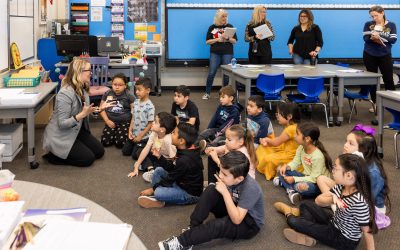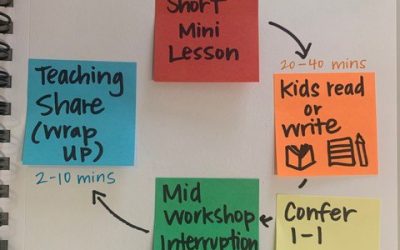After visiting hundreds of schools, I’ve noticed there’s often confusion around the stages of the writing process.
The old school way of teaching writing had everyone doing this:
BRAINSTORM → PRE-WRITE → DRAFT → PUBLISH
I’ve seen many teachers with a store-bought Lakeshore poster outlining these steps — and here’s the problem:
In writing workshop, we want to give kids time to learn how to write in different genres. We aim to take them through the stages slowly and carefully and teach them strategies for how to do each of these things.
So rather than brainstorming on a Monday and publishing your piece on a Friday, you’ll be brainstorming for a few days and publishing about a month later.
Here are the stages of the writing process we recommend for the upper grades (3-8):
Here’s advice for the younger grades.
There seems to be a lot of confusion in the upper grades about when you’re working in your writer’s notebook and when you begin to draft and get your writing ready for publication. We’re in the notebook until we get to the drafting phase. It’s very important that kids spend at least a week trying on different topics and ideas before they commit to one. If this happens in a day or two, they’ll likely end up with a topic they don’t care enough about to keep working on it.
Building a common language in any community is essential. The different stages of the writing process have been named in different ways — here, I’ll share the most common names. As a school, it will be important for you to decide how you’ll refer to each stage, and then use these words consistently.
Stage 1: Immersion- 2-5 Days (before and during the unit of study)
Immersion is a key component of the writing workshop that takes place at the beginning of a new unit and usually lasts from 2-5 days. During this time, students are immersed in examples of the new writing genre. When done thoroughly, the immersion period sets up clear expectations for students and helps them to see the whole of the writing before the teacher goes in to teach it part by part. We’ve found that it sets students up to be more successful in this type of writing right from the beginning. Remember that after any immersion mini-lesson, students should be sent off to write (for the same amount of time they’d spend during writing workshop). They could write in the new genre (approximating how it goes since they haven’t been explicitly taught how to write in this genre yet). They could also write in a previously taught genre, or if you are comfortable with giving them more choice, you could let them do any type of writing they choose. Keep in mind that the goal of writing workshop is to build students’ confidence and get them writing!
Read more about immersion here.
Stage 2: Collecting/Generating/Gathering – 2-5 Days (Week 1)
This stage happens in notebooks where they’re spending time generating different ideas for the writing we’re planning. For example, in the personal narrative units, students generate seed entries that sound like stories. For the persuasive unit, they generate ideas about topics that are important to them. For informational writing, they choose topics they know about and consider their audiences. Here they’re trying out different topics and ideas and exploring how they might go.
Stage 3: Choosing/Developing/Nurturing – 1-2 Days (Week 1/2)
Committing to an idea that has the most significance to the writer. Writers might spend time using their pens (and/or their partners) to help them think through the reasons why the choice is a good one for them. They may be thinking why did I choose this topic? Why is this important to me? What do I want my readers to think and feel? Who might read this piece of writing? Essentially writers are trying to figure out what the heart of their piece is. (They’ll continue using their notebooks for this.)
Stage 4: Planning – 1-3 Days (Week 2)
This happens in notebooks or drafting folders and might entail making a timeline or story mountain, could be the use of oral storytelling, creating boxes and bullets or a drafting booklet with sketches. Again, specifics depend on the genre; however, the goal of this stage is to rehearse for the draft.
Stage 5: Drafting – 1-2 Days (Week 3)
The drafting stage happens outside of the notebook on ‘drafting paper’ and can be kept in a writing folder. It should be fast and furious and done over 1-2 days.
Writers should NOT be copying what they’ve written in their notebooks but rather writing it anew and to the best of their ability using all their writing skills and techniques. If you feel a writer cannot sustain the length of time you plan to be working through the process on one piece, you might encourage them to draft two pieces. More sophisticated writers are usually able to spend more time working on a draft because they have the skill and stamina. They may also draft the same idea or piece in different ways if they have time.
Stage 6: Revising – 3-5 Days (Week 3)
The heart of the writing process! Encourage revisions throughout the process — and keep in mind that students also benefit from staying in this stage for a few days to help them re-see their writing — improving the qualities of the writing. Often, teachers work with students on leads, ending, elaborating in your piece, taking out parts that don’t fit. You can use revision strips and pens during this phase of the writing process.
Stage 7: Editing — 1-2 Days (Week 4)
Correcting the writing for punctuation, capitalization, conventions, mechanics, spelling, grammar, and readability. Students do this independently — teachers aren’t correcting their work for them. Students may have partners work with them to double-check their work for mistakes.
Stage 8: Publishing – 1-2 Days (Week 4)
Making a final copy that’s neat and legible and putting it out into the world! Publishing a piece shouldn’t take more than 2 days — the stages before publishing are more important than publishing itself — it’s more about the process than the product! Students can add title and cover pages, dedication pages, about the author pages, back of the book blurbs, etc.
Stage 9: Celebration & Reflection – 1 Day (Week 4)
Teachers choose a plan for their celebrations and have students reflect on what they’ve done well and what they could do better next time. This is a great time for students to set goals for themselves as writers too.
Some celebrations could be:
- Displaying work on a bulletin board in or outside of the classroom for other students, parents, visitors to read
- Reading their pieces to a small group or partner
- Meeting with a buddy class — whether upper or lower grade to share their pieces
- Inviting parents to see the writing
- Setting up the writing as a museum for students to walk around and read each other’s pieces and write compliments to each other
This is also a good time to have students do a post On Demand writing to see what they’ve learned from this unit. This will allow you to compare from beginning to end of the unit and let you see what of your teaching really ‘stuck’!
Here are some examples of how you might display this visually so that students get comfortable with each stage.
If you enjoyed this article you’ll also enjoy these too:
- The writing process for primary grades
- Yes, You Can Start Workshop On Day One!
- Creating a Community of Readers and Writers Through Immersion













